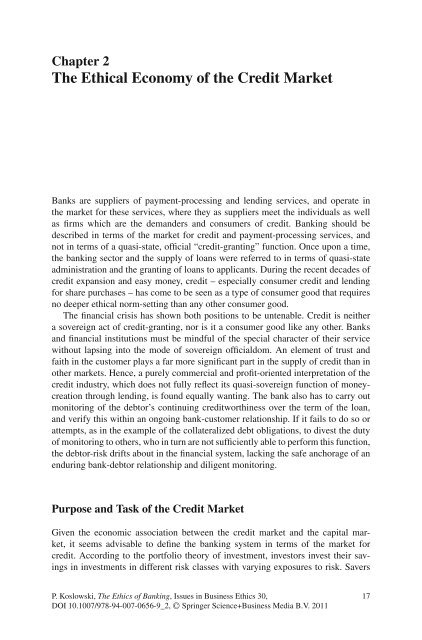The Ethics of Banking: Conclusions from the Financial Crisis (Issues ...
The Ethics of Banking: Conclusions from the Financial Crisis (Issues ...
The Ethics of Banking: Conclusions from the Financial Crisis (Issues ...
You also want an ePaper? Increase the reach of your titles
YUMPU automatically turns print PDFs into web optimized ePapers that Google loves.
Chapter 2<br />
<strong>The</strong> Ethical Economy <strong>of</strong> <strong>the</strong> Credit Market<br />
Banks are suppliers <strong>of</strong> payment-processing and lending services, and operate in<br />
<strong>the</strong> market for <strong>the</strong>se services, where <strong>the</strong>y as suppliers meet <strong>the</strong> individuals as well<br />
as firms which are <strong>the</strong> demanders and consumers <strong>of</strong> credit. <strong>Banking</strong> should be<br />
described in terms <strong>of</strong> <strong>the</strong> market for credit and payment-processing services, and<br />
not in terms <strong>of</strong> a quasi-state, <strong>of</strong>ficial “credit-granting” function. Once upon a time,<br />
<strong>the</strong> banking sector and <strong>the</strong> supply <strong>of</strong> loans were referred to in terms <strong>of</strong> quasi-state<br />
administration and <strong>the</strong> granting <strong>of</strong> loans to applicants. During <strong>the</strong> recent decades <strong>of</strong><br />
credit expansion and easy money, credit – especially consumer credit and lending<br />
for share purchases – has come to be seen as a type <strong>of</strong> consumer good that requires<br />
no deeper ethical norm-setting than any o<strong>the</strong>r consumer good.<br />
<strong>The</strong> financial crisis has shown both positions to be untenable. Credit is nei<strong>the</strong>r<br />
a sovereign act <strong>of</strong> credit-granting, nor is it a consumer good like any o<strong>the</strong>r. Banks<br />
and financial institutions must be mindful <strong>of</strong> <strong>the</strong> special character <strong>of</strong> <strong>the</strong>ir service<br />
without lapsing into <strong>the</strong> mode <strong>of</strong> sovereign <strong>of</strong>ficialdom. An element <strong>of</strong> trust and<br />
faith in <strong>the</strong> customer plays a far more significant part in <strong>the</strong> supply <strong>of</strong> credit than in<br />
o<strong>the</strong>r markets. Hence, a purely commercial and pr<strong>of</strong>it-oriented interpretation <strong>of</strong> <strong>the</strong><br />
credit industry, which does not fully reflect its quasi-sovereign function <strong>of</strong> moneycreation<br />
through lending, is found equally wanting. <strong>The</strong> bank also has to carry out<br />
monitoring <strong>of</strong> <strong>the</strong> debtor’s continuing creditworthiness over <strong>the</strong> term <strong>of</strong> <strong>the</strong> loan,<br />
and verify this within an ongoing bank-customer relationship. If it fails to do so or<br />
attempts, as in <strong>the</strong> example <strong>of</strong> <strong>the</strong> collateralized debt obligations, to divest <strong>the</strong> duty<br />
<strong>of</strong> monitoring to o<strong>the</strong>rs, who in turn are not sufficiently able to perform this function,<br />
<strong>the</strong> debtor-risk drifts about in <strong>the</strong> financial system, lacking <strong>the</strong> safe anchorage <strong>of</strong> an<br />
enduring bank-debtor relationship and diligent monitoring.<br />
Purpose and Task <strong>of</strong> <strong>the</strong> Credit Market<br />
Given <strong>the</strong> economic association between <strong>the</strong> credit market and <strong>the</strong> capital market,<br />
it seems advisable to define <strong>the</strong> banking system in terms <strong>of</strong> <strong>the</strong> market for<br />
credit. According to <strong>the</strong> portfolio <strong>the</strong>ory <strong>of</strong> investment, investors invest <strong>the</strong>ir savings<br />
in investments in different risk classes with varying exposures to risk. Savers<br />
P. Koslowski, <strong>The</strong> <strong>Ethics</strong> <strong>of</strong> <strong>Banking</strong>, <strong>Issues</strong> in Business <strong>Ethics</strong> 30,<br />
DOI 10.1007/978-94-007-0656-9_2, C○ Springer Science+Business Media B.V. 2011<br />
17

















